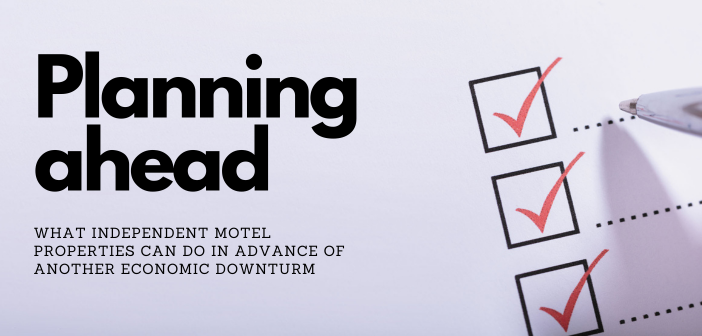What independent motel properties can do in advance of another economic downturn
It’s been more than three years since the COVID-19 pandemic started. During that time, independent hoteliers across the United States have had to overcome a raft of challenges, including staffing shortages, mask mandates, supply-chain disruptions, interest-rate hikes, and much more.
And, as the industry stares down an unclear future – including the possibility of additional rate hikes and unpredictable economic conditions – it can feel overwhelming. However, there are six key areas in which independent operators can focus their efforts to best prepare their properties today for tomorrow’s uncertainties.
 FUND RESERVES
FUND RESERVES
In any time of economic prosperity, it’s vital to build up financial reserves before an eventual economic downturn strikes. By having additional funds available, owners will have a better chance to combat an economic recession. No hotelier wants to face an inability to pay their mortgages, property taxes, or employees. If owners are unable to bear these costs, they will have no choice but to consider that their lender may foreclose on their property. Having cash reserves of at least six-to-eight months of monthly expenses would help significantly in the event of a recession.
 ONLINE MARKETING
ONLINE MARKETING
Understandably, hoteliers aren’t always proponents of OTAs. But, during an economic downturn, having a few rooms filled is better than having no rooms filled. By maximizing hotel exposure on the internet, one should be confident knowing they did everything they could to market their hotel online. More specifically, if an independent motel owner dislikes OTAs because they don’t like paying commissions, there is little doubt a nearby competitor will maximize their revenue by taking potential reservations away from that independent property.
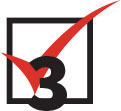 PROPERTY CONDITION
PROPERTY CONDITION
If you have your fund reserves built up and your property adequately marketed online, all that effort may be for naught if your hotel’s physical condition isn’t up to par. In an economic downturn, property condition and cleanliness are perhaps more vital than ever because you’re competing for a smaller pool of potential guests. By updating your room’s flooring, paint, and furniture often, your hotel will be up-to-date and contemporary. With fewer potential guests, you want to give yourself the best chance possible to maximize bookings by providing a cleaner environment, as well. To achieve this, you could incentivize your staff with more work hours by advising them to conduct routine cleaning and maintenance of common areas like the parking lot, laundry rooms, and lobby.
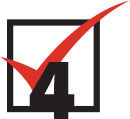 STAFFING
STAFFING
When revenue and general room sales are down, a key area to examine when cutting expenses would be reducing overhead. But, when the economic downturn is short-lived – like many experienced after the initial months of the pandemic – a property may experience a quick resurgence of reservations and be left severely understaffed.
During the pandemic, the hoteliers who maintained staffing levels and offered more hours once things re-opened were likely able to recover quicker, primarily because they prioritized their employees’ health and safety and economic wellbeing. Going above and beyond for their employees paid major dividends to hotel owners who had staff ready to handle the influx of reservations and uptick in room sales.
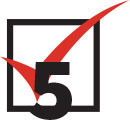 INVENTORY
INVENTORY
Who would’ve thought toilet paper would be one of the major supply-chain items that would cause so much stir when short on availability? What seems like afterthought now, the shortage on toilet paper was a chief concern across the country. As a result, large retailers to small convenient stores had to put a limit on how many packages of toilet paper consumers were allowed to purchase. This had a dramatic effect on hotels as one of the most basic hotel amenities wasn’t readily available. Therefore, having adequate or overstocked inventory at your hotel would be ideal.
When the next economic downturn hits, the supply chain would almost certainly be affected, resulting in necessary items not being readily. No one can predict the future, but it may be best to have an overstock on certain basic amenities at your hotel like soap, bedding, and towels.
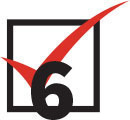 MORTGAGES
MORTGAGES
At the beginning of the pandemic, borrowing rates were very affordable. Last year, however, we witnessed a significant rise in interest rates. The independent hoteliers who refinanced their mortgages before the rise of interest rates are now very well-positioned to manage a future economic downturn. Having lower payments and lower liabilities should allow an independent hotelier to manage expenses much more easily than someone who has a mortgage with a high interest rate. That’s why it’s crucial in the age of the internet to keep yourself well-informed on the intricacies of the U.S. economy and the financial affairs of the rest of the world.
Ultimately, it’s important that hoteliers continue to evaluate their experiences during any economic downturn and use those lessons to plan for the future. While managing a recession always will be difficult, it’s possible to use past events to shape how we respond to the future.

